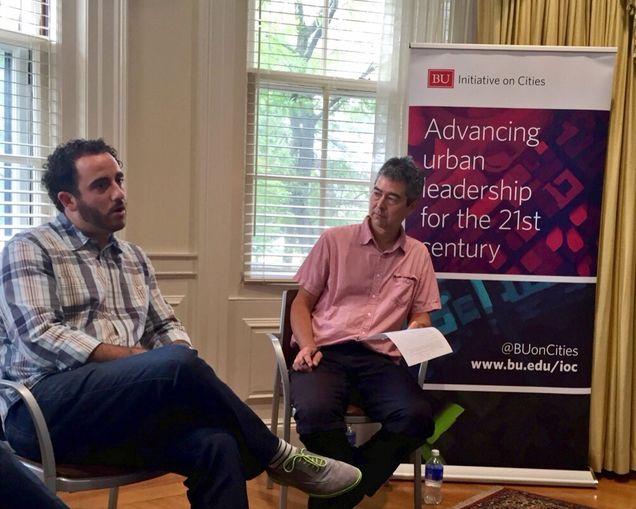Inclusive Sharing Economy USS Page
The Inclusive Sharing Economy
The sharing economy has redefined how urban populations access and enjoy their cities by democratizing travel, transportation, commerce, and more. But does the sharing economy benefit all members of the urban community? How can city leaders ensure that services like Zipcar, Airbnb, and Hubway have a positive, inclusive impact?
Moderated by Nathan Phillips, Professor of Earth and Environment at Boston University, The Inclusive Sharing Economy featured Justin Holmes, Director of Corporate Communications and Public Policy at Zipcar, Giorgos Zervas, Assistant Professor at the Boston University Questrom School of Business, and Braden Golub, Founder and CEO of SPOT parking,
Phillips noted that Robin Chase, Founder of Zipcar, famously said that 95% of personally owned cars sit idle 95% of the time, representing a massive underuse capacity and an opportunity for increased efficiency and a more environmentally friendly, sustainable approach to transportation.
Platforms like Zipcar, Airbnb, and SPOT parking – a company that allows the owners of private parking spots to rent them out to other drivers – provide a means for cities to identify these problem areas and be more efficient and sustainable.
The sharing economy is growing at a rapid clip. Zervas, who has researched Airbnb, reported that the company had 40 million bookings in 2014 and expected to double that number by the end of 2015. Holmes noted that Zipcar, founded in 2000, has established a presence in 470 cities and towns and is still expanding. But inclusion stands as a key challenge for the sharing economy. Do these platforms benefit all parts of a city equally? Are they accessible to all urban populations?
 Zervas argued that one positive aspect of the sharing economy is the low barrier of entry – theoretically, anyone can participate. However, trust and reputation play an important role. Research has found that people with better reputations get more business. Many platforms allow consumers to be rated, potentially limiting access for bad customers. And because platforms like Airbnb are largely peer-to-peer transactions, biases can come into play, whether consciously or unconsciously. There are tradeoffs that agents in the sharing economy must be aware of.
Zervas argued that one positive aspect of the sharing economy is the low barrier of entry – theoretically, anyone can participate. However, trust and reputation play an important role. Research has found that people with better reputations get more business. Many platforms allow consumers to be rated, potentially limiting access for bad customers. And because platforms like Airbnb are largely peer-to-peer transactions, biases can come into play, whether consciously or unconsciously. There are tradeoffs that agents in the sharing economy must be aware of.
Meanwhile, according to Holmes, Zipcar has seen growth in communities with transportation and income gaps, suggesting a push for greater equity. Through acquisitions and expansions, they hope to continue serving low-income populations and provide them with new transportation options. And by reaching underserved audiences, platforms like Zipcar can increase their customer base and widen their reach, achieving a positive social impact without compromising financial goals. For example, Zipcar has focused on serving older populations through a partnership with AARP, unlocking a larger pool of potential customers while reaching those who could benefit most from better transportation options.
It became clear that platforms often benefit from promoting their contributions to the community and the environment. Zipcar, for example, is an appealing partner for cities because of their positive environmental impact and their clear moral compass, said Holmes. Meanwhile, Golub argued that cities want to work with SPOT because easier parking and transportation options lure more people into the city centers, increasing tourism, shopping, foot traffic, and residents.
In considering the future of the sharing economy, the panelists agreed that several challenges remain, especially the question of whether agents on platforms are treated as employees or contractors, and whether local governments can adopt fair and reasonable tax policies that protect local interests without restricting growth.
Finally, when asked whether institutions like Boston University can play a supportive role, Zervas suggested that better access to data and collaboration around field experiments would be critical in allowing faculty and students to help push the sharing economy forward.